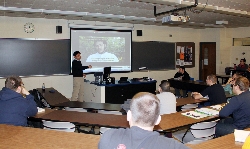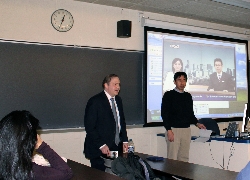University News
Former WIU Int'l Student Shares South Asia Experiences with LEJA Students
February 27, 2012
MACOMB, IL – It was by chance that Shoji Motooka came across information through an online search engine about Western Illinois University's minor in homeland security. Although he was familiar with WIU -- in fact, he chose Western in the early 1990s for his international study experience in journalism as a young Japanese college student -- Motooka had no idea WIU offered an undergraduate minor in homeland security. The topic is of significant importance to Motooka, as he spent August through early this month as a Visiting Fellow at the Paul H. Nitze School of Advanced International Studies at Johns Hopkins University examining the U.S. government's counter-terrorism policies.
After discovering Western's homeland security minor, which as of Spring 2012 has 180 students, Motooka was even more intrigued to find about Dean Alexander's work in the WIU's School of Law Enforcement and Justice Administration (LEJA). Alexander, an associate professor, also directs the Homeland Security Research Program (HSRP) and often travels nationally and abroad to study terrorists and deliver lectures about terrorism.
Motooka contacted Alexander in January, explained his background and asked Alexander if he would be able to meet with him while he was traveling in the area. After hearing about Motooka's U.S. fellowship, his connection to Western and Motooka's professional experiences in South Asia -- Motooka spent a few years as the Islamabad (Pakistan) and Kabul (Afghanistan) bureau chief and a foreign correspondent for NHK, Japan Broadcasting Corp. -- Alexander not only agreed to meet with Motooka, but he also invited him to be a guest lecturer in his LEJA 414 course, "Legal Aspects of Homeland Security and Terrorism."
"Through the School of Law Enforcement and Justice Administration and the Homeland Security Research Program, we organize events on campus to expose students to different perspectives about terrorism and homeland security. For instance, in the 2010-2011 academic year, we hosted a seminar, 'Terrorist Threats in the AfPak-India Region and Its Implications for the United States,' that featured international experts, and we organized a homeland security lecture series last fall, as well," Alexander explained. "When Mr. Motooka contacted me, I felt it was a serendipitous opportunity for him and for WIU students. His experiences in South Asia provided another opportunity to expose students to additional perspectives about terrorism, and it provided him with the chance to learn more about our homeland security undergraduate minor, the HSRP and visit his former place of study in Macomb," Alexander said.
In his presentation to the students in the LEJA 414 course late last month, Motooka discussed what it was like to work as the bureau chief for NHK's Islamabad and Kabul bureaus, as well as the difficulty of covering terrorist-related issues and activities in that region of the world. He also showed students video interviews with known terrorists and a disturbing video news package that highlighted how the agricultural production of opium poppies (used to make heroin) has impacted the welfare of a poverty-stricken Afghani family.
As for Motooka, all the information he gathered during his time as a Visiting Fellow at Johns Hopkins University, including his visit to WIU, will be compiled in a report for his employer, NHK. He said the experiences he had while studying here in the U.S. over the last six months will also be beneficial to him in his news editor position in the international news division of NHK's news department
"To me, after studying and examining the U.S. government's counter-terrorism policies, I learned the U.S. is still very serious about fighting terrorism, both homegrown terrorism and terrorism abroad," Motooka explained. "Terrorism seems to be still very much a first priority of government in the U.S. Having the opportunity to learn about in the U.S. was a great experience for me, and I am lucky to have had this opportunity. This is not a common practice of NHK or very many news media outlets in Japan. In fact, I am one of the few news editors at NHK to have such an opportunity. When I started the fellowship, I had no idea I would find the homeland security academic program and research being done here at Western, a place that I studied at so many years ago."
For more information, contact Alexander at DC-Alexander@wiu.edu. Learn more about Western's School of Law Enforcement and Justice Administration at www.wiu.edu/coehs/leja/ and the Homeland Security Research Program at www.wiu.edu/hsrp/.
Posted By: Teresa Koltzenburg (WIUNews@wiu.edu)
Office of University Communications & Marketing



Connect with us: